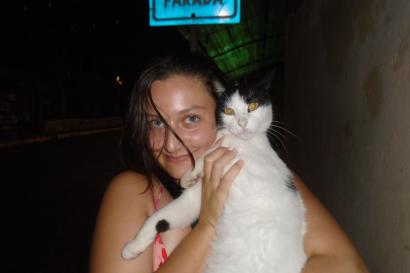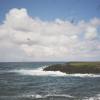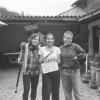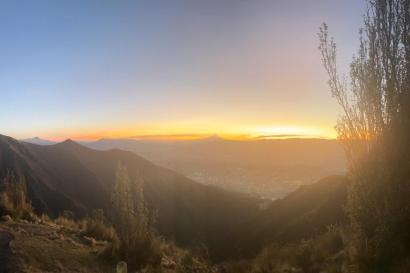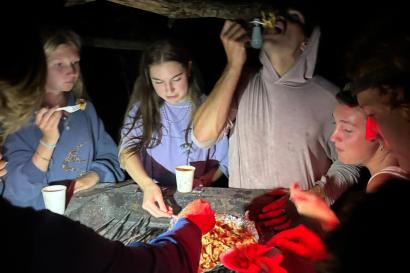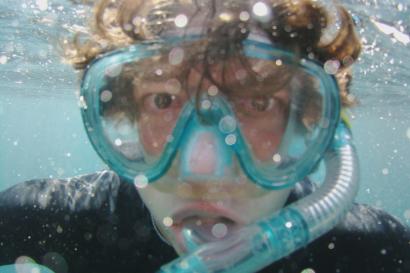As the old saying goes, an eye for a thousand makes the whole world Evangelical.
Rachel Saint was an American missionary who dedicated her life to learning the language of the Amazonian Huaorani people in order to translate the Bible and spread it among their remote, indigenous, semi-nomadic community in Ecuador. With the word of a Lord made in Saint’s image, she brought disease and oil barons, all for the sake of salvation. Anthropologists appeared out of thin air while metal gifts rained from the sky. This successful mission began only after the death of 5 missionaries in 1956, including a man named Nate Saint. It seemed a fair enough trade: the Huaorani killed Rachel Saint’s brother, so she killed their god.
"I'll tell you what I think," he said. "I think it's funny how everyone in your country looks down here at rainforest destruction and they think, 'How could all those ignorant people tear up such a beautiful place and kill all those animals and make all those medically valuable plants extinct, and then have nothing but a big desert left afterward?, That's the way they think, isn't it?" I didn't answer. Carlos didn't give me time to. "But you see what the problem is here in Ecuador?" he went on. "It's oil. We're trying to protect this forest by using it for tours, to let it earn money without being destroyed. But oil is more valuable. Our country needs oil to pay its debt to your banks. Your country needs oil because everyone has two cars. So my question is, who's really destroying the Cuyabeno forest, Ecuadorians or Americans?" - Mike Tidwell, "Amazon Stranger"
When I started writing this, I thought it’d be about the biodiversity of the rainforest, the surreal feeling of growing up with the Amazon as some far-off mythical place that exists only in my earth science textbooks only to spend a real week of my life in the very same place. I thought it’d be about the minimum three daily showers, the borrowed rain boots, the humidity curling up the edges of my passport. And it is. It is about all of that. It’s also about how I got there in the first place.
Before I saw the scarlet macaws and the jaguars and the spider monkeys, I saw a smokestack – a bright orange stain bleeding into the dark green cathedral. After taking a plane to a bus to a boat, we were halfway through our journey to the Tiputini Biodiversity Station, located inside the Yasuní national park, which was established in 1979 and contains 982,000 hectares of tropical rainforest. Ten years later, the broader region of 2.7 million hectares was designated as a UNESCO biosphere reserve, which sounds very cool, but effectively means nothing when regulated by a national environmental ministry that lacks the political and financial power to enforce any of its policies. Before another few hours in a boat down the river, we had to travel by bus on a road called Via Auca (or “Savage Way”), which was built by Texaco, now owned by Chevron. The other road in the area is called Via Maxus, built by Maxus-Ecuador, an oil company whose headquarters are just an hour drive away from where my mother was raised in Texas. Maxus Oil was part of the American same company, Diamond Shamrock Corporation, that produced Agent Orange, the infamous bioweapon used in the Vietnam war. This road was constructed following the highly-criticized illegal procedures of a treaty signature, as portrayed in the documentary Trinkets and Beads. As we ate our boxed lunches and complained about the humidity, we were instructed not to take pictures of anything on the oil company’s property. And, as everyone knows, any organization that prohibits the presence of journalism is only doing very wonderful, ethical things!
I could tell you about eating lemon ants or floating in the Tiputini river. I could tell you about waking up at 4am to stargaze, or giving myself a temporary tattoo of a mustache with the juice from the Jagua fruit that actually lasted for one week instead of one night. But I want to tell you instead about the role of the visitor, especially in the context of environmental science. I don’t believe in research for research’s sake. I don’t want to be here doing science, just so I can see it before it goes away for good. I want to be here to make it last a little longer.
Conservation is not some amorphous thing that we can achieve without people at the center of it. We have to think about the stewards of the land we hope to save, not just the charismatic megafauna that live inside of that land. The preservation of the Amazon is inextricably linked to the practices of those who lived and continue to live there. Before they were ghettoized, the Huaorani used sustainable tactics including rotational hunting practices, allowing all areas of the rainforest to recover before hunting in them again. Still, the mythical image of the “natural ecologist” or the “noble savage” only feeds the ecotourism operations that rely on overexploitation and commodification not only of indigenous lands, but of their cultural practices.
One of our assignments in the rainforest was to dig a couple holes. We were like, sure, yay, shovel, but we didn’t think much of it until we realized that it was to illustrate his point that we wouldn’t find a tree with roots deeper than eight inches in Tiputini. The nutrient-rich soil is so shallow because of the constant rains washing away its top layer. Roots grow out, instead of down and despite how shallow these systems are, they support the tallest trees I’ve ever seen. I could write that poem, but there’s really no need. It’s already written. I read it and I touched it and now I’m sharing it with you.
In less than a month, I’m coming back home to a country that cares even less than it already did about environmental policy after spending a week inside of the Earth's lungs, and I’d be lying if I said that didn’t terrify me. Every day that I’m here, I’m asked to think about abiotic and biotic interactions. How everything needs everything around and inside of it. How tussock grasses in the paramo are often composed of large amounts of necromass, which is to say that they carry their dead with them in order to keep from burning alive. How the Amazon’s mixed-species flocks can serve as a big communal map for each other, each bird’s spatial memory benefitting the next’s. How those roads the oil companies built have created a fishbone pattern of deforestation, majorly impacting the wildlife in the region. How they wouldn’t have been able to build them in the first place without Rachel Saint, with her Bibles and polio.
I guess I’m saying I don’t want to be a parasite. My girlfriend* makes fun of me for calling this semester a “trip”, which is fair – yes, we’re here for months as students, not just as tourists. Sure, we’re working hard and learning lots, but I don’t think I’ll be able to look back on this time without just considering it a beautiful vacation until I do something with everything I’ve seen. The truth is that I have no idea what that may be just yet, but I know it must be something. Until I figure it out, I’m doing my best to be involved with the local communities here as much as I can. Say hello to your neighbors – in their language. Don’t be a savior. The thing about salvation is that it keeps being offered by the same people who caused the destruction in the first place. I’m the American with a camera – a figure that has been harming people for the last century. That’s a responsibility I don’t take lightly. Like many Americans who think of themselves as socially conscious, I come from a world of words and theory. I’d like to move to a place of praxis.
I’ve been thinking a lot about Ecuador’s current constitution, which grants inalienable rights to Nature or Pachamama. I’ve been thinking about the stories we rewrite in order to occupy lands, as though they were without people all along. I’ve been thinking a lot about Rachel Corrie's emails. I’ve been thinking about how often this story repeats itself – against my own ancestors in the Caribbean, against native communities in the U.S., against the people of Palestine. I’ve been thinking about what my part in all of it is at the heart of the empire. I really don’t know yet. It’s our responsibility to figure it out and leave things a little better.
*I start a lot of my sentences like this now. I’d forgotten how much of a gift it is to love someone.
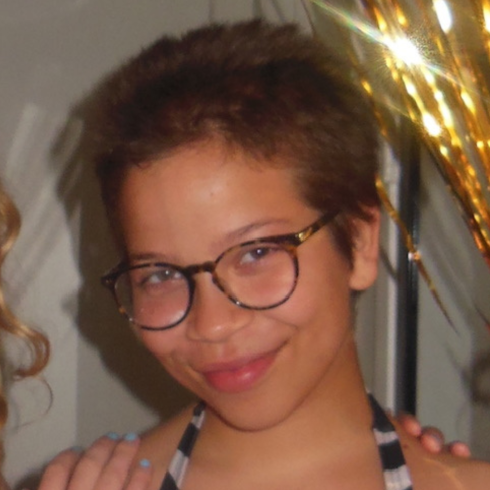
Anya Jiménez
Anya Jiménez is a Screenwriting major with a minor in Environmental Studies. She got scuba certified before learning how to drive, but as a New Yorker, she never thought she’d need a license. Anya was wrong and pays for this act of hubris daily.
